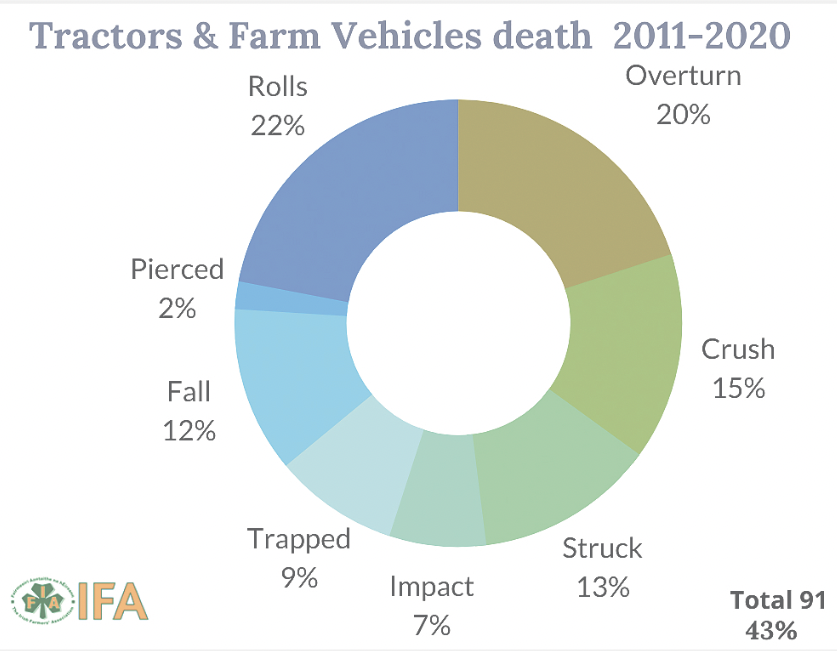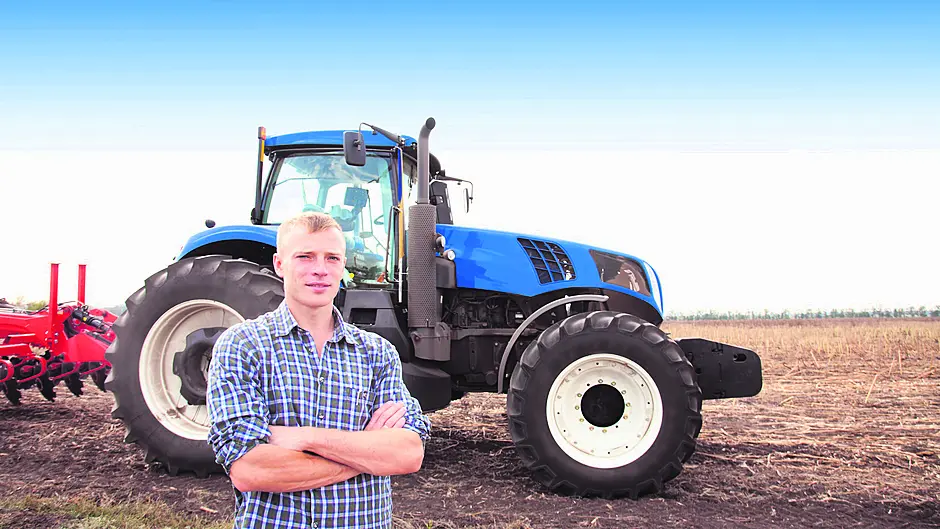BY EIMEAR O'DWYER
Young people play a vital role on many family farms and learn their way alongside experienced farmers, but increasingly powerful tractors require even stronger safety.
Some people involved in the farming industry have called for an increase in the legal age one can acquire a tractor licence. Meanwhile, others are seeking improved regulation in this area to make training and testing mandatory. Either way, the debate between stakeholders remains unresolved.
Following the tragic deaths of two teenagers in separate tractor accidents in May, there has been renewed calls for better tractor safety measures to be implemented.
According to the Road Safety Authority (RSA), at age 16 you can apply for a category W licence to drive a tractor and there is no requirement to have a qualified accompanying driver with you on public roads.
‘We have a situation where a 16-year-old on a provisional licence can essentially drive 12 or 14 tonne of a tractor and 20 tonne of a trailer,’ said Senator Tim Lombard, Fine Gael spokesperson on agriculture.
‘It’s effectively driving an articulated truck,’ he added.
Furthermore, the Health and Safety Authority (HSA) states that children over 14 can operate tractors on farms once they have received formal training and are
supervised by a responsible adult.
‘Whether it’s appropriate that a 14-year-old should be in charge of machinery like that is very, very debatable,’ said Sen Lombard.
Sen Lombard believes that a mature debate between all farming organisations, the Department of Agriculture, and farming families about the issue of young people driving tractors is key to improving farm safety.
‘These aren’t your traditional tractors that were there in the 70s and 80s, these are significant machines,’ he noted.
The Minane Bridge farmer said the aim is not to overregulate people but to encourage young people to get involved in the industry once we ensure it is safe for them to do so, through updating existing laws, for instance. He noted that there have been recent farm accidents in his locality, highlighting the severity of this issue.
‘I think it’s a significant responsibility to give a young person and I think that the laws that were set out regarding provisional licences for tractor driving have dramatically changed regarding the size and power of these machines,’ he said.
Alma Jordan, founder of Agrikids, the farm safety educational platform for children and teachers, agrees that tractors have become larger, more powerful machines which should require more safety precautions.
However, Alma does not believe that increasing the legal age will create meaningful change. Alternatively, she favours the proposal of mandatory testing and certification to ensure that tractor users are adequately trained.
‘What I would like to see is some kind of interception taking place before this age group hits the road,’ she said.
‘If they can’t take a two-and-a-half-tonne car, why are they allowed to take a seven-tonne tractor without having any kind of competency testing done?’ she asked.
Alma has witnessed the real-life, heart-breaking impact of farm tragedies. She believes there is a lack of co-ordination between the bodies involved in the agriculture industry which has prevented a solution being reached. For meaningful change to be achieved she says all parties involved need to co-operate.
‘We need a proper, certified, responsible, commonsense approach to tractors,’ she said.
‘This issue is falling down between so many cracks and at the end of the day it’s us farmers that are suffering,’ she said.
In 2018 Fianna Fáil Senator Paul Daly proposed a Farm Safety Agency Bill, which sought to create an agency within the HSA with responsibility for farm safety, based on the RSA model.
He told the Seanad that the RSA model had reduced road deaths considerably, and he believed having an agency with responsibility for farm safety based on this model would reduce farm fatalities in the same way.
The agency would not be a sub-committee or forum, but an agency with statutory and legislative footing, he told the Seanad. However, with the creation of the farm safety mandate within the role of Minister of State at the Department of Agriculture, this bill was paused, Senator Hayes told The Southern Star.
John McNamara, health and safety specialist with Teagasc, said the group supports a change of culture and behaviour on farms, which he believes is needed alongside existing legislation.
John is working with Teagasc and the University of Galway on a study to prevent ‘knockdowns’ on farms, which he says account for a large proportion of farm fatalities.
He says that communication and training are fundamental, to make both younger and older farmers aware of risks in the changing farm industry.
A spokesperson for the RSA said they run many educational programmes nationwide and they regularly attend the National Ploughing Championships and Tullamore Show where they discuss the importance of tractor safety with young people and parents.
Meanwhile, a spokesperson for An Garda Síochána said it proactively enforces road traffic legislation in relation to the use of agricultural vehicles on Irish roads and encourages the responsible operation of all vehicles.
‘Where individuals are found in contravention of the relevant legislation, appropriate enforcement action can and will be taken,’ the spokesperson noted.
An Garda Síochána said they do not comment on proposed changes to legislation.
The Southern Star has sought a comment from the Minister of State at the Department of Agriculture, Food and the Marine, with responsibility for farm safety, Martin Heydon.

HALF OF FARM ACCIDENTS INVOLVE MACHINERY
FARMING is a hazardous occupation, with up to 50% of all workplace deaths taking place on farms.
Between 2011 and 2020 there were 93 vehicle-related fatalities in Ireland, with tractors involved in over half of these incidents, according to the Health and Safety Authority (HSA).
More than half of the fatalities on farms in the past decade involved farm vehicles and machinery.
HSA figures from 2018-2022 show a total of 34 vehicle-related fatalities on farms with 18 of those deaths involving tractors.
As per the HSA Farm Safety Action Plan 2021-2024, a Tractor and High-Risk Machinery Working Group was created to improve the safe operation of farm machinery. The group has several mandates including investigating licensing, training and assessment requirements.
A spokesperson for the HSA said that work is ongoing on all items in the action plan.










